人教版(2019) 选择性必修第四册 Unit 1 Science Fiction Using Language课件(31张)
文档属性
| 名称 | 人教版(2019) 选择性必修第四册 Unit 1 Science Fiction Using Language课件(31张) | 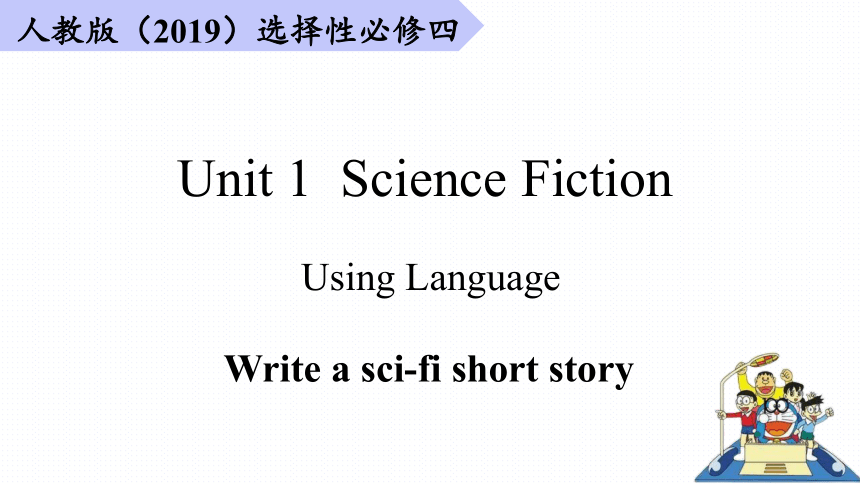 | |
| 格式 | zip | ||
| 文件大小 | 3.1MB | ||
| 资源类型 | 教案 | ||
| 版本资源 | 人教版(2019) | ||
| 科目 | 英语 | ||
| 更新时间 | 2022-05-02 20:44:39 | ||
图片预览

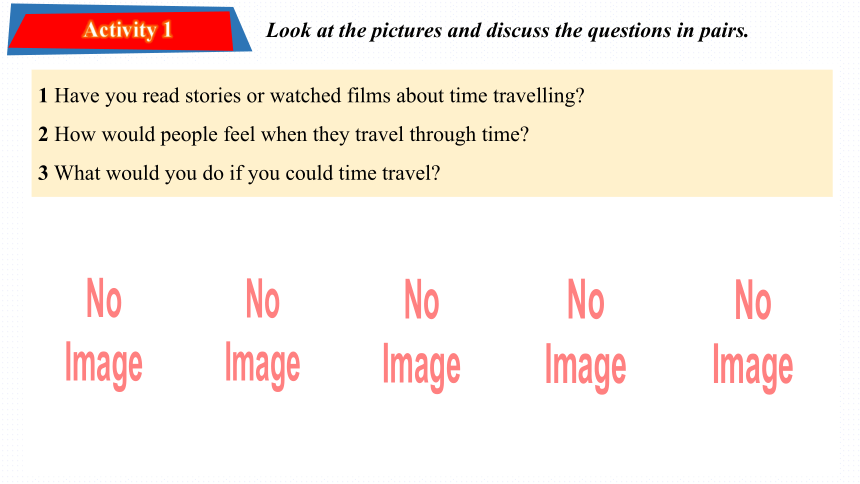
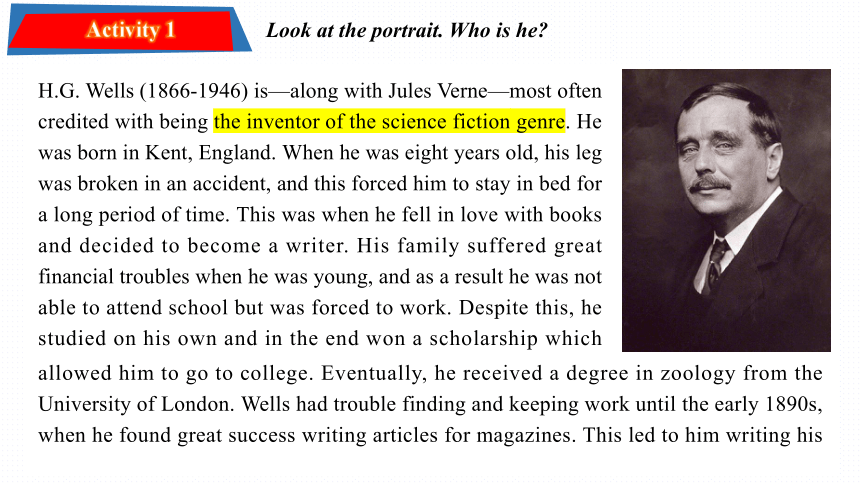
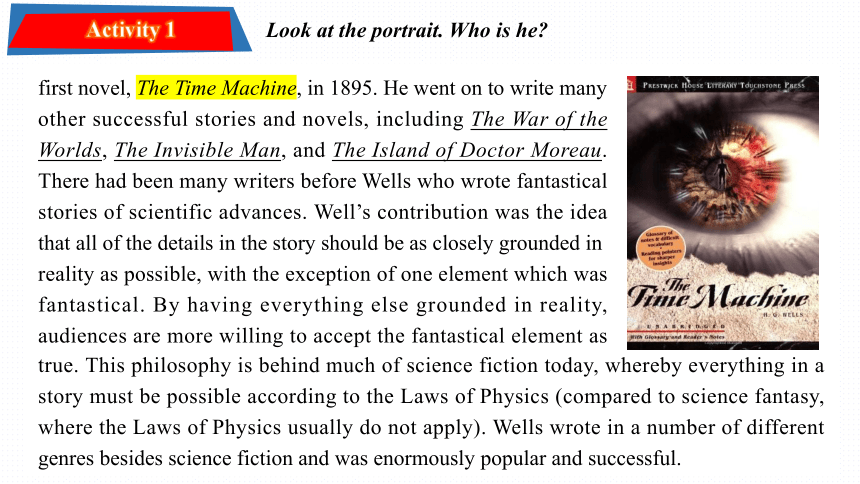
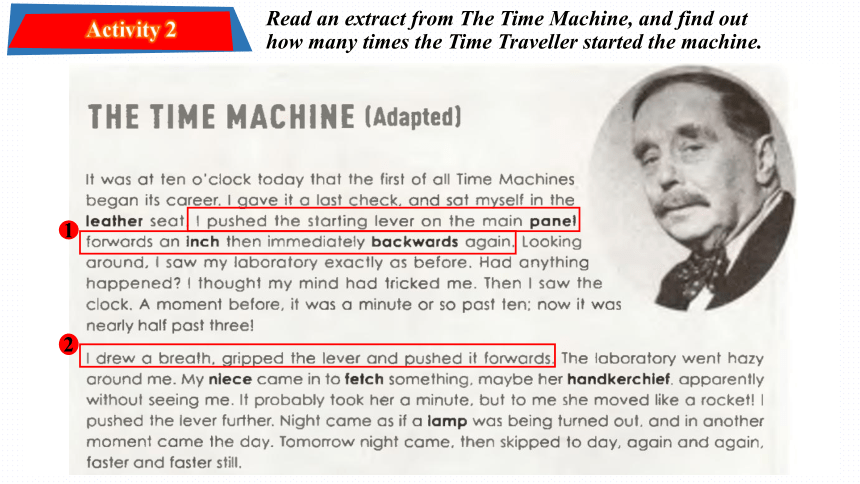
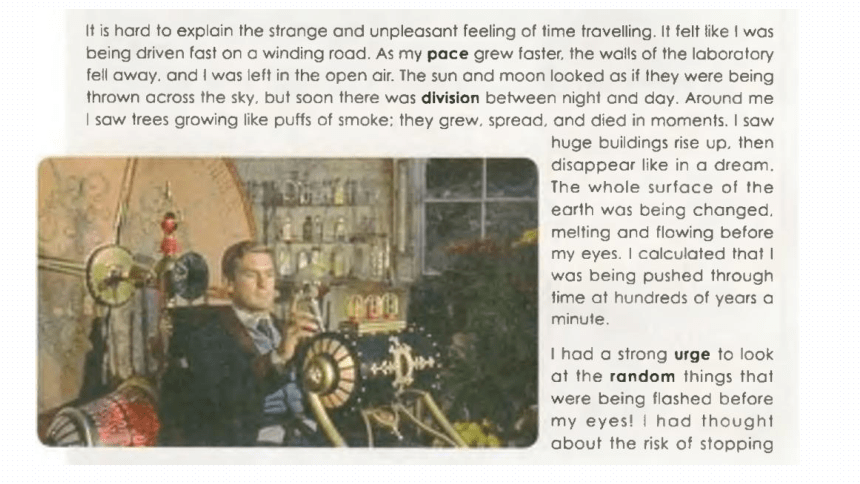
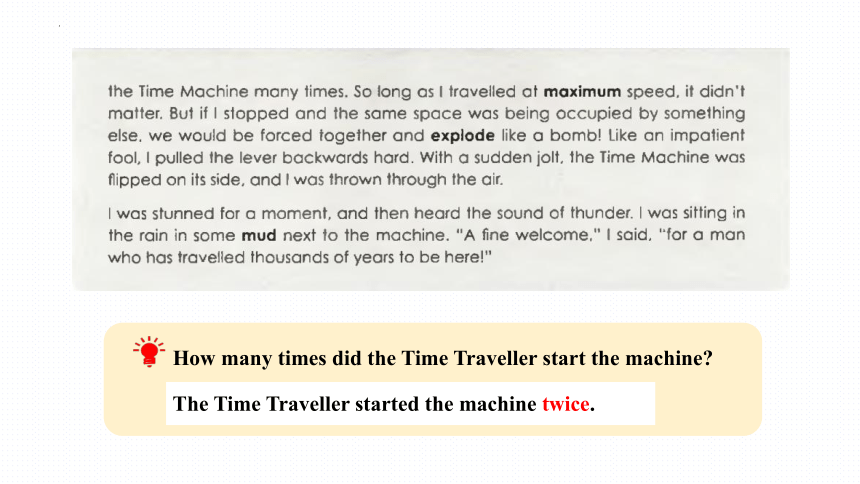
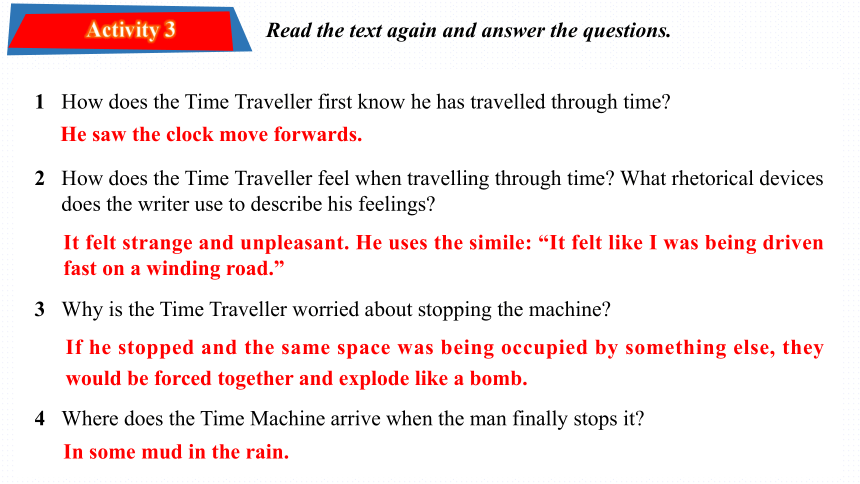
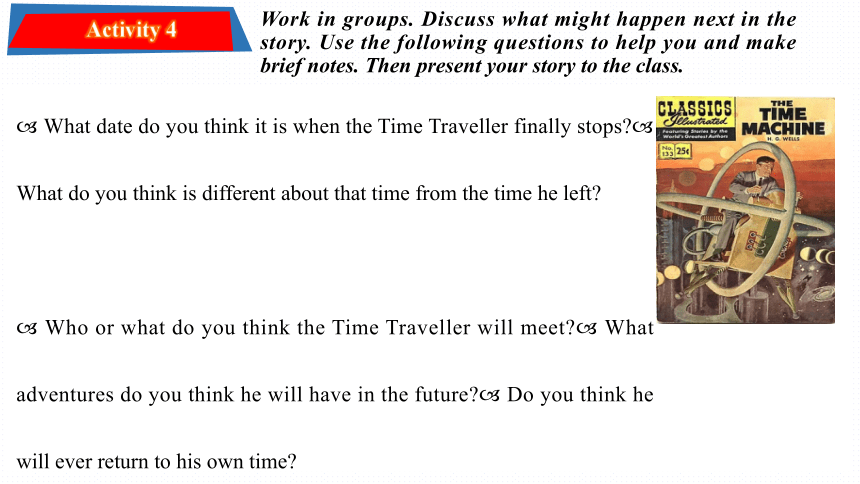
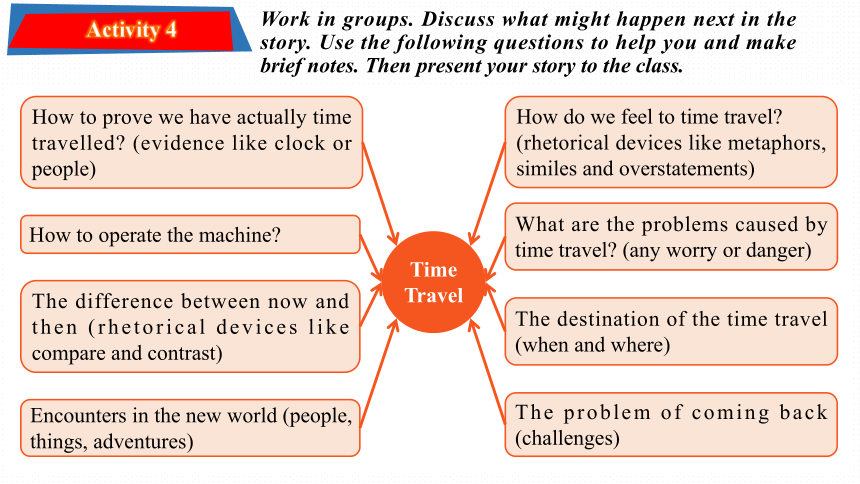
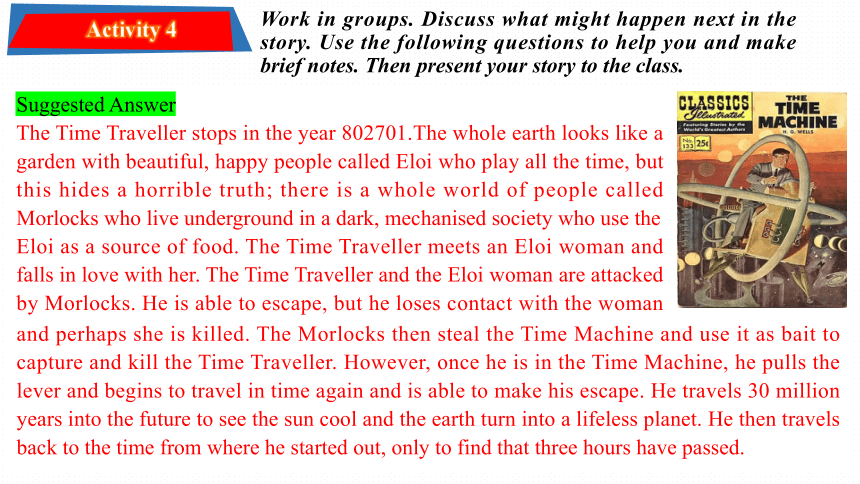
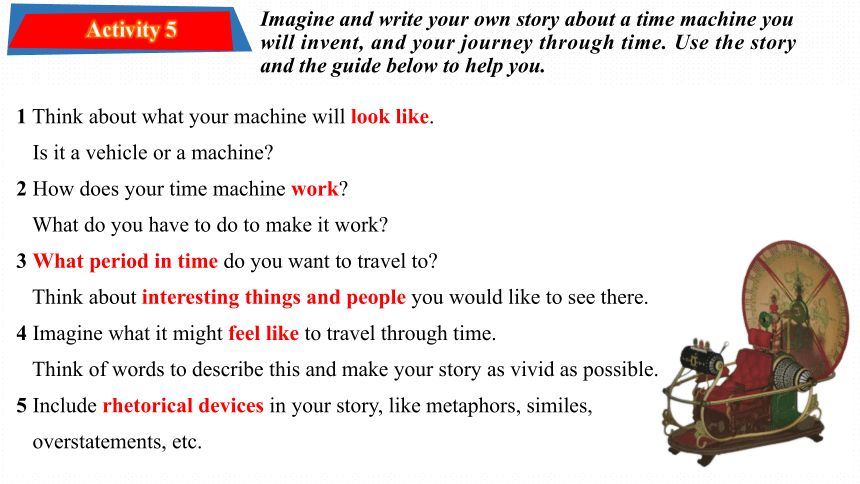
文档简介
(共31张PPT)
人教版(2019)选择性必修四
Unit 1 Science Fiction
Using Language
Write a sci-fi short story
Look at the pictures and discuss the questions in pairs.
Activity 1
1 Have you read stories or watched films about time travelling
2 How would people feel when they travel through time
3 What would you do if you could time travel
Look at the portrait. Who is he
Activity 1
H.G. Wells (1866-1946) is—along with Jules Verne—most often credited with being the inventor of the science fiction genre. He was born in Kent, England. When he was eight years old, his leg was broken in an accident, and this forced him to stay in bed for a long period of time. This was when he fell in love with books and decided to become a writer. His family suffered great financial troubles when he was young, and as a result he was not able to attend school but was forced to work. Despite this, he studied on his own and in the end won a scholarship which
allowed him to go to college. Eventually, he received a degree in zoology from the University of London. Wells had trouble finding and keeping work until the early 1890s, when he found great success writing articles for magazines. This led to him writing his
Look at the portrait. Who is he
Activity 1
first novel, The Time Machine, in 1895. He went on to write many other successful stories and novels, including The War of the Worlds, The Invisible Man, and The Island of Doctor Moreau. There had been many writers before Wells who wrote fantastical stories of scientific advances. Well’s contribution was the idea that all of the details in the story should be as closely grounded in reality as possible, with the exception of one element which was fantastical. By having everything else grounded in reality, audiences are more willing to accept the fantastical element as
true. This philosophy is behind much of science fiction today, whereby everything in a story must be possible according to the Laws of Physics (compared to science fantasy, where the Laws of Physics usually do not apply). Wells wrote in a number of different genres besides science fiction and was enormously popular and successful.
Read an extract from The Time Machine, and find out how many times the Time Traveller started the machine.
Activity 2
1
2
How many times did the Time Traveller start the machine
The Time Traveller started the machine twice.
1 How does the Time Traveller first know he has travelled through time
In some mud in the rain.
4 Where does the Time Machine arrive when the man finally stops it
2 How does the Time Traveller feel when travelling through time What rhetorical devices
does the writer use to describe his feelings
3 Why is the Time Traveller worried about stopping the machine
He saw the clock move forwards.
It felt strange and unpleasant. He uses the simile: “It felt like I was being driven fast on a winding road.”
If he stopped and the same space was being occupied by something else, they would be forced together and explode like a bomb.
Read the text again and answer the questions.
Activity 3
Work in groups. Discuss what might happen next in the story. Use the following questions to help you and make brief notes. Then present your story to the class.
Activity 4
What date do you think it is when the Time Traveller finally stops What do you think is different about that time from the time he left
Who or what do you think the Time Traveller will meet What adventures do you think he will have in the future Do you think he will ever return to his own time
Work in groups. Discuss what might happen next in the story. Use the following questions to help you and make brief notes. Then present your story to the class.
Activity 4
Time Travel
How do we feel to time travel
(rhetorical devices like metaphors, similes and overstatements)
What are the problems caused by time travel (any worry or danger)
The destination of the time travel (when and where)
The problem of coming back (challenges)
Encounters in the new world (people, things, adventures)
The difference between now and then (rhetorical devices like compare and contrast)
How to operate the machine
How to prove we have actually time travelled (evidence like clock or people)
Activity 4
Suggested Answer
The Time Traveller stops in the year 802701.The whole earth looks like a garden with beautiful, happy people called Eloi who play all the time, but this hides a horrible truth; there is a whole world of people called Morlocks who live underground in a dark, mechanised society who use the Eloi as a source of food. The Time Traveller meets an Eloi woman and falls in love with her. The Time Traveller and the Eloi woman are attacked by Morlocks. He is able to escape, but he loses contact with the woman
and perhaps she is killed. The Morlocks then steal the Time Machine and use it as bait to capture and kill the Time Traveller. However, once he is in the Time Machine, he pulls the lever and begins to travel in time again and is able to make his escape. He travels 30 million years into the future to see the sun cool and the earth turn into a lifeless planet. He then travels back to the time from where he started out, only to find that three hours have passed.
Work in groups. Discuss what might happen next in the story. Use the following questions to help you and make brief notes. Then present your story to the class.
Imagine and write your own story about a time machine you will invent, and your journey through time. Use the story and the guide below to help you.
Activity 5
1 Think about what your machine will look like.
Is it a vehicle or a machine
2 How does your time machine work
What do you have to do to make it work
3 What period in time do you want to travel to
Think about interesting things and people you would like to see there.
4 Imagine what it might feel like to travel through time.
Think of words to describe this and make your story as vivid as possible.
5 Include rhetorical devices in your story, like metaphors, similes,
overstatements, etc.
Activity 5
Content Rhetorical device
Beginning
Developing
Climax
Ending
Imagine and write your own story about a time machine you will invent, and your journey through time. Use the story and the guide below to help you.
Exchange your draft with a partner and revise the draft using your partner’s comments. Then share your story with the rest of the class.
Activity 6
Sample Writing
I thought this summer vacation at Aunt Jenny’s would go as interesting as watching paint dry. Hers was an old house, built before time began, it seemed. One hundred years ago it was often filled with people coming to stay for the summer—it was such large, grand house that there would be thirty or forty guests at a time, and the host barely knew who some of them were. Then there was the host himself—my great grandfather. He was widely thought of as the smartest, funniest man of his age, and people would come from all over the world to see him.
But that was all in the past. Now the only person who lived here was Aunt Jenny, who lived in one small part of the house and kept the rest closed up. Then I caught the sun shining in my eyes from a tall mirror in the hallway.
“How pretty! It must be a hundred years old. If only I could go back and see my great grandfather!” I said, cleaning the dirt off the mirror with my hand. Suddenly, the shiny mirror became a sea of clouds and I felt myself being pulled inside it. The world began to spin, and I felt confused.
Then, just like that, everything stopped. I looked around, and there I was with the mirror and in the same hall, but things were different. The family photos on the wall were now replaced by paintings of people I did not recognise. The furniture all looked new but old-fashioned at the same time. “I must be one hundred years into the past!” I thought to myself. Then a woman wearing old-fashioned clothing came down the hall. Drawing near, she frowned and said, “Oh, that won’t do! The party starts in twenty minutes and you are still in casual clothes! What You didn’t bring anything I’ve got a lovely dress you can borrow. I think it will just fit.” She led me away to her room and helped me get dressed like I was an old friend, and then together we went down to the parlour, which was filled with people dressed in fine clothes gathering around my great grandfather, listening to every word he said.
I spent the summer there, pretending to be a distant cousin from the city who was there on holiday. No one seemed to mind or care, as my great grandfather was quite wealthy and always had lots of guests. I tried to spend as much time as possible with my great grandfather and his friends, and it was the most wonderful time of my life.
Then when the end of summer drew near, I went back to the mirror and rubbed it with my hand again. I found myself back in the same hall, but in modern time. Not a minute had passed. Then I realised that I still had a full summer ahead at boring Aunt Jenny’s. “Now what am I going to do ” I asked myself.
leather n. ______________________________
lever n. ______________________________
panel n. ______________________________
inch n. ______________________________
backwards adv. ______________________________
grip vt. & vi. ______________________________
hazy adj. ______________________________
niece n. ______________________________
皮革;[pl.] 皮衣;皮外套
英寸(长度单位,等于2.54厘米)
紧握;抓紧
模糊的;朦胧的;困惑的
控制板;仪表盘;专家咨询组
侄女:外甥女
向后;倒着;往回
操纵杆;杠杆
Words and Phrases
fetch vt. __________________________________
handkerchief n. __________________________________
lamp n. __________________________________
turn out __________________________________
pace n. __________________________________
vt. & vi. __________________________________
fall away __________________________________
division n. __________________________________
(去)拿来;(去)请来
关掉;熄灭;在场;使朝外;结果是
(逐渐)减少;消失
灯;台灯
分开;分隔;差异;除(法)
速度;步伐;节奏
手帕;纸巾
Words and Phrases
确定速度;调整节奏
puff n. __________________________________
urge n. __________________________________
vt. __________________________________
have an urge to __________________________________
random adj. __________________________________
maximum adj. __________________________________
n. ________________________________
(烟、气等的)一缕;少量;喘息
有强烈的欲望做某事
最大极限的
最大量;最大限度
催促;力劝;大力推荐
随机的;不可思议的
强烈的欲望;冲动
Words and Phrases
pace
1. n. the speed at which sb/sth walks, runs or moves (移动的)速度;步速
to set off at a steady/gentle/leisurely pace 以稳定的/徐缓的/悠闲的步子出发
Congestion frequently reduces traffic to walking pace.
交通阻塞经常把车流的速度降低得如步行一般缓慢。
The runners have noticeably quickened their pace.
赛跑者明显加快了脚步。
The ball gathered pace as it rolled down the hill.
随着球向山下滚动,它的速度越来越快。
重点单词
pace
2. n. ~ (of sth) the speed at which sth happens 发生的速度;步伐;节奏
It is difficult to keep up with the rapid pace of change.
跟上迅速的变化是很困难的。
We encourage all students to work at their own pace.
我们鼓励学生都按自己的节奏学习。
I prefer the relaxed pace of life in the country.
我喜爱乡间那悠闲的生活节奏。
3. n. an act of stepping once when walking or running; the distance travelled when doing this (走或跑时)迈出的一步,一步的距离;步幅
She took two paces forward. 她向前走了两步。
pace
4. v. walk at a steady and consistent speed, especially without a particular destination and as an expression of one’s anxiety or annoyance 恒速行走;(尤指忧虑或烦恼时无目的地)踱步
We paced up and down in exasperation.
我们恼火地来回踱步。
She had been pacing the room.
她一直在房间里走来走去。
pace
5. v. measure (a distance) by walking it and counting the number of steps taken 步测
I paced out the dimensions of my new home.
我用步子测出了我的新房子的大小。
6. v. lead (another runner in a race) in order to establish a competitive speed 为……领跑
McKenna paced us for four miles.
麦克纳为我们领跑了四英里。
pace
7. v. move or develop (something) at a particular rate or speed 为……定速度;为……调整速度
The action is paced to the beat of a perky march. 按照轻快进行曲的节奏行动。
our fast-paced daily lives 我们快节奏的日常生活
IDIOMS
go through/show your paces 展示自己的能力
keep pace (with sb/sth) (与……)并驾齐驱;(与……)步调一致
off the pace (赛跑或比赛中)在领头人之后,在领头队之后
put sb/sth through their/its paces 考察,考验(某人的能力)
set the pace 确定速度;确立标准;领先
urge
1. n. ~ (to do sth) a strong desire to do sth 强烈的欲望;冲动
He had an urge to open a shop of his own. 他很想开一家自己的商店。
2. v.to advise or try hard to persuade sb to do sth 敦促;催促;力劝
She urged him to stay. 她力劝他留下。
3. v.~ sth (on/upon sb) to recommend sth strongly 大力推荐;竭力主张
The situation is dangerous, and the UN is urging caution.
局势岌岌可危,联合国力主谨慎行事。
IDIOMS
urge sb on 鼓励;激励;为……加油
She could hear him urging her on as she ran past.
她跑过他面前时,听到他在为她加油。
explode
1. v. to burst or make sth burst loudly and violently, causing damage 爆炸;爆破;爆裂
Bombs were exploding all around the city. 城里到处都响起炸弹的爆炸声。
2. v. ~ (into/with sth) (of a person or situation) to suddenly become very angry or dangerous 勃然(大怒);大发(雷霆);突然发生(危险)
Suddenly Charles exploded with rage. 查尔斯勃然大怒。
3. v. ~ (into/with sth) to suddenly express an emotion 突然爆发,迸发(感情)
We all exploded into wild laughter. 我们都一下子大笑起来。
explode
4. v. ~ (into sth) to suddenly and quickly do sth; to move suddenly with a lot of force 突然做起……来;突然活跃起来
After ten minutes the game exploded into life. 比赛在十分钟后突然激烈起来。
5. v. to make a sudden loud noise 突然发出巨响
Thunder exploded overhead. 雷声在头顶上炸开。
6. v. to increase suddenly and very quickly in number 突增;激增
the exploding world population 迅猛增长的世界人口
7. v. to show that sth is not true, especially sth that people believe 推翻;驳倒;破除
A women’s magazine has exploded the myth that thin equals beautiful.
一家妇女杂志推翻了瘦即美的神话。
1 It was at ten o’clock today that the first of all Time Machines began its
career.
译文:上午十点,所有时间机器中的第一台启动了其运转之旅。
分析:该句是强调句式,强调开启时间机器之旅的时间。强调句式结构为
“It is (was)+被强调部分(主语、宾语或状语)+who (that)+其他部分...”。
长难句
2 I pushed the starting lever on the main panel forwards an inch then
immediately backwards again.
译文:我把主面板上的启动杆往前推了一英寸,然后又立刻向后拉。
分析:该句描述的是时间旅行者第一次开启时光机器的场景。the starting
lever意为“启动杆”,push forwards表示“启动”,push backwards
表示“制动”。
长难句
3 Night came as if a lamp was being turned out, and in another moment came
the day.
译文:夜幕降临了,仿佛一盏灯正在熄灭,转眼间,白昼就来临了。
分析:该句描述的是时间旅行昼夜交替的快速。本句用了比喻的修辞手法,
将夜晚的到来之快与熄灯这一动作进行类比,突出说明时间旅行中夜
晚降临之快。and后面的句子是倒装句。谓语动词came前置。
长难句
4 If I stopped and the same space was being occupied by something else, we
would be forced together and explode like a bomb!
译文:如果我停下来,同一空间被别的东西占据,我们就会被挤在一起,然
后像炸弹一样爆炸!
分析:该句if引导的条件状语从句,从句用一般过去时,根据主将从现的原
则,主句用过去将来时。
长难句
人教版(2019)选择性必修四
Unit 1 Science Fiction
Using Language
Write a sci-fi short story
Look at the pictures and discuss the questions in pairs.
Activity 1
1 Have you read stories or watched films about time travelling
2 How would people feel when they travel through time
3 What would you do if you could time travel
Look at the portrait. Who is he
Activity 1
H.G. Wells (1866-1946) is—along with Jules Verne—most often credited with being the inventor of the science fiction genre. He was born in Kent, England. When he was eight years old, his leg was broken in an accident, and this forced him to stay in bed for a long period of time. This was when he fell in love with books and decided to become a writer. His family suffered great financial troubles when he was young, and as a result he was not able to attend school but was forced to work. Despite this, he studied on his own and in the end won a scholarship which
allowed him to go to college. Eventually, he received a degree in zoology from the University of London. Wells had trouble finding and keeping work until the early 1890s, when he found great success writing articles for magazines. This led to him writing his
Look at the portrait. Who is he
Activity 1
first novel, The Time Machine, in 1895. He went on to write many other successful stories and novels, including The War of the Worlds, The Invisible Man, and The Island of Doctor Moreau. There had been many writers before Wells who wrote fantastical stories of scientific advances. Well’s contribution was the idea that all of the details in the story should be as closely grounded in reality as possible, with the exception of one element which was fantastical. By having everything else grounded in reality, audiences are more willing to accept the fantastical element as
true. This philosophy is behind much of science fiction today, whereby everything in a story must be possible according to the Laws of Physics (compared to science fantasy, where the Laws of Physics usually do not apply). Wells wrote in a number of different genres besides science fiction and was enormously popular and successful.
Read an extract from The Time Machine, and find out how many times the Time Traveller started the machine.
Activity 2
1
2
How many times did the Time Traveller start the machine
The Time Traveller started the machine twice.
1 How does the Time Traveller first know he has travelled through time
In some mud in the rain.
4 Where does the Time Machine arrive when the man finally stops it
2 How does the Time Traveller feel when travelling through time What rhetorical devices
does the writer use to describe his feelings
3 Why is the Time Traveller worried about stopping the machine
He saw the clock move forwards.
It felt strange and unpleasant. He uses the simile: “It felt like I was being driven fast on a winding road.”
If he stopped and the same space was being occupied by something else, they would be forced together and explode like a bomb.
Read the text again and answer the questions.
Activity 3
Work in groups. Discuss what might happen next in the story. Use the following questions to help you and make brief notes. Then present your story to the class.
Activity 4
What date do you think it is when the Time Traveller finally stops What do you think is different about that time from the time he left
Who or what do you think the Time Traveller will meet What adventures do you think he will have in the future Do you think he will ever return to his own time
Work in groups. Discuss what might happen next in the story. Use the following questions to help you and make brief notes. Then present your story to the class.
Activity 4
Time Travel
How do we feel to time travel
(rhetorical devices like metaphors, similes and overstatements)
What are the problems caused by time travel (any worry or danger)
The destination of the time travel (when and where)
The problem of coming back (challenges)
Encounters in the new world (people, things, adventures)
The difference between now and then (rhetorical devices like compare and contrast)
How to operate the machine
How to prove we have actually time travelled (evidence like clock or people)
Activity 4
Suggested Answer
The Time Traveller stops in the year 802701.The whole earth looks like a garden with beautiful, happy people called Eloi who play all the time, but this hides a horrible truth; there is a whole world of people called Morlocks who live underground in a dark, mechanised society who use the Eloi as a source of food. The Time Traveller meets an Eloi woman and falls in love with her. The Time Traveller and the Eloi woman are attacked by Morlocks. He is able to escape, but he loses contact with the woman
and perhaps she is killed. The Morlocks then steal the Time Machine and use it as bait to capture and kill the Time Traveller. However, once he is in the Time Machine, he pulls the lever and begins to travel in time again and is able to make his escape. He travels 30 million years into the future to see the sun cool and the earth turn into a lifeless planet. He then travels back to the time from where he started out, only to find that three hours have passed.
Work in groups. Discuss what might happen next in the story. Use the following questions to help you and make brief notes. Then present your story to the class.
Imagine and write your own story about a time machine you will invent, and your journey through time. Use the story and the guide below to help you.
Activity 5
1 Think about what your machine will look like.
Is it a vehicle or a machine
2 How does your time machine work
What do you have to do to make it work
3 What period in time do you want to travel to
Think about interesting things and people you would like to see there.
4 Imagine what it might feel like to travel through time.
Think of words to describe this and make your story as vivid as possible.
5 Include rhetorical devices in your story, like metaphors, similes,
overstatements, etc.
Activity 5
Content Rhetorical device
Beginning
Developing
Climax
Ending
Imagine and write your own story about a time machine you will invent, and your journey through time. Use the story and the guide below to help you.
Exchange your draft with a partner and revise the draft using your partner’s comments. Then share your story with the rest of the class.
Activity 6
Sample Writing
I thought this summer vacation at Aunt Jenny’s would go as interesting as watching paint dry. Hers was an old house, built before time began, it seemed. One hundred years ago it was often filled with people coming to stay for the summer—it was such large, grand house that there would be thirty or forty guests at a time, and the host barely knew who some of them were. Then there was the host himself—my great grandfather. He was widely thought of as the smartest, funniest man of his age, and people would come from all over the world to see him.
But that was all in the past. Now the only person who lived here was Aunt Jenny, who lived in one small part of the house and kept the rest closed up. Then I caught the sun shining in my eyes from a tall mirror in the hallway.
“How pretty! It must be a hundred years old. If only I could go back and see my great grandfather!” I said, cleaning the dirt off the mirror with my hand. Suddenly, the shiny mirror became a sea of clouds and I felt myself being pulled inside it. The world began to spin, and I felt confused.
Then, just like that, everything stopped. I looked around, and there I was with the mirror and in the same hall, but things were different. The family photos on the wall were now replaced by paintings of people I did not recognise. The furniture all looked new but old-fashioned at the same time. “I must be one hundred years into the past!” I thought to myself. Then a woman wearing old-fashioned clothing came down the hall. Drawing near, she frowned and said, “Oh, that won’t do! The party starts in twenty minutes and you are still in casual clothes! What You didn’t bring anything I’ve got a lovely dress you can borrow. I think it will just fit.” She led me away to her room and helped me get dressed like I was an old friend, and then together we went down to the parlour, which was filled with people dressed in fine clothes gathering around my great grandfather, listening to every word he said.
I spent the summer there, pretending to be a distant cousin from the city who was there on holiday. No one seemed to mind or care, as my great grandfather was quite wealthy and always had lots of guests. I tried to spend as much time as possible with my great grandfather and his friends, and it was the most wonderful time of my life.
Then when the end of summer drew near, I went back to the mirror and rubbed it with my hand again. I found myself back in the same hall, but in modern time. Not a minute had passed. Then I realised that I still had a full summer ahead at boring Aunt Jenny’s. “Now what am I going to do ” I asked myself.
leather n. ______________________________
lever n. ______________________________
panel n. ______________________________
inch n. ______________________________
backwards adv. ______________________________
grip vt. & vi. ______________________________
hazy adj. ______________________________
niece n. ______________________________
皮革;[pl.] 皮衣;皮外套
英寸(长度单位,等于2.54厘米)
紧握;抓紧
模糊的;朦胧的;困惑的
控制板;仪表盘;专家咨询组
侄女:外甥女
向后;倒着;往回
操纵杆;杠杆
Words and Phrases
fetch vt. __________________________________
handkerchief n. __________________________________
lamp n. __________________________________
turn out __________________________________
pace n. __________________________________
vt. & vi. __________________________________
fall away __________________________________
division n. __________________________________
(去)拿来;(去)请来
关掉;熄灭;在场;使朝外;结果是
(逐渐)减少;消失
灯;台灯
分开;分隔;差异;除(法)
速度;步伐;节奏
手帕;纸巾
Words and Phrases
确定速度;调整节奏
puff n. __________________________________
urge n. __________________________________
vt. __________________________________
have an urge to __________________________________
random adj. __________________________________
maximum adj. __________________________________
n. ________________________________
(烟、气等的)一缕;少量;喘息
有强烈的欲望做某事
最大极限的
最大量;最大限度
催促;力劝;大力推荐
随机的;不可思议的
强烈的欲望;冲动
Words and Phrases
pace
1. n. the speed at which sb/sth walks, runs or moves (移动的)速度;步速
to set off at a steady/gentle/leisurely pace 以稳定的/徐缓的/悠闲的步子出发
Congestion frequently reduces traffic to walking pace.
交通阻塞经常把车流的速度降低得如步行一般缓慢。
The runners have noticeably quickened their pace.
赛跑者明显加快了脚步。
The ball gathered pace as it rolled down the hill.
随着球向山下滚动,它的速度越来越快。
重点单词
pace
2. n. ~ (of sth) the speed at which sth happens 发生的速度;步伐;节奏
It is difficult to keep up with the rapid pace of change.
跟上迅速的变化是很困难的。
We encourage all students to work at their own pace.
我们鼓励学生都按自己的节奏学习。
I prefer the relaxed pace of life in the country.
我喜爱乡间那悠闲的生活节奏。
3. n. an act of stepping once when walking or running; the distance travelled when doing this (走或跑时)迈出的一步,一步的距离;步幅
She took two paces forward. 她向前走了两步。
pace
4. v. walk at a steady and consistent speed, especially without a particular destination and as an expression of one’s anxiety or annoyance 恒速行走;(尤指忧虑或烦恼时无目的地)踱步
We paced up and down in exasperation.
我们恼火地来回踱步。
She had been pacing the room.
她一直在房间里走来走去。
pace
5. v. measure (a distance) by walking it and counting the number of steps taken 步测
I paced out the dimensions of my new home.
我用步子测出了我的新房子的大小。
6. v. lead (another runner in a race) in order to establish a competitive speed 为……领跑
McKenna paced us for four miles.
麦克纳为我们领跑了四英里。
pace
7. v. move or develop (something) at a particular rate or speed 为……定速度;为……调整速度
The action is paced to the beat of a perky march. 按照轻快进行曲的节奏行动。
our fast-paced daily lives 我们快节奏的日常生活
IDIOMS
go through/show your paces 展示自己的能力
keep pace (with sb/sth) (与……)并驾齐驱;(与……)步调一致
off the pace (赛跑或比赛中)在领头人之后,在领头队之后
put sb/sth through their/its paces 考察,考验(某人的能力)
set the pace 确定速度;确立标准;领先
urge
1. n. ~ (to do sth) a strong desire to do sth 强烈的欲望;冲动
He had an urge to open a shop of his own. 他很想开一家自己的商店。
2. v.to advise or try hard to persuade sb to do sth 敦促;催促;力劝
She urged him to stay. 她力劝他留下。
3. v.~ sth (on/upon sb) to recommend sth strongly 大力推荐;竭力主张
The situation is dangerous, and the UN is urging caution.
局势岌岌可危,联合国力主谨慎行事。
IDIOMS
urge sb on 鼓励;激励;为……加油
She could hear him urging her on as she ran past.
她跑过他面前时,听到他在为她加油。
explode
1. v. to burst or make sth burst loudly and violently, causing damage 爆炸;爆破;爆裂
Bombs were exploding all around the city. 城里到处都响起炸弹的爆炸声。
2. v. ~ (into/with sth) (of a person or situation) to suddenly become very angry or dangerous 勃然(大怒);大发(雷霆);突然发生(危险)
Suddenly Charles exploded with rage. 查尔斯勃然大怒。
3. v. ~ (into/with sth) to suddenly express an emotion 突然爆发,迸发(感情)
We all exploded into wild laughter. 我们都一下子大笑起来。
explode
4. v. ~ (into sth) to suddenly and quickly do sth; to move suddenly with a lot of force 突然做起……来;突然活跃起来
After ten minutes the game exploded into life. 比赛在十分钟后突然激烈起来。
5. v. to make a sudden loud noise 突然发出巨响
Thunder exploded overhead. 雷声在头顶上炸开。
6. v. to increase suddenly and very quickly in number 突增;激增
the exploding world population 迅猛增长的世界人口
7. v. to show that sth is not true, especially sth that people believe 推翻;驳倒;破除
A women’s magazine has exploded the myth that thin equals beautiful.
一家妇女杂志推翻了瘦即美的神话。
1 It was at ten o’clock today that the first of all Time Machines began its
career.
译文:上午十点,所有时间机器中的第一台启动了其运转之旅。
分析:该句是强调句式,强调开启时间机器之旅的时间。强调句式结构为
“It is (was)+被强调部分(主语、宾语或状语)+who (that)+其他部分...”。
长难句
2 I pushed the starting lever on the main panel forwards an inch then
immediately backwards again.
译文:我把主面板上的启动杆往前推了一英寸,然后又立刻向后拉。
分析:该句描述的是时间旅行者第一次开启时光机器的场景。the starting
lever意为“启动杆”,push forwards表示“启动”,push backwards
表示“制动”。
长难句
3 Night came as if a lamp was being turned out, and in another moment came
the day.
译文:夜幕降临了,仿佛一盏灯正在熄灭,转眼间,白昼就来临了。
分析:该句描述的是时间旅行昼夜交替的快速。本句用了比喻的修辞手法,
将夜晚的到来之快与熄灯这一动作进行类比,突出说明时间旅行中夜
晚降临之快。and后面的句子是倒装句。谓语动词came前置。
长难句
4 If I stopped and the same space was being occupied by something else, we
would be forced together and explode like a bomb!
译文:如果我停下来,同一空间被别的东西占据,我们就会被挤在一起,然
后像炸弹一样爆炸!
分析:该句if引导的条件状语从句,从句用一般过去时,根据主将从现的原
则,主句用过去将来时。
长难句
